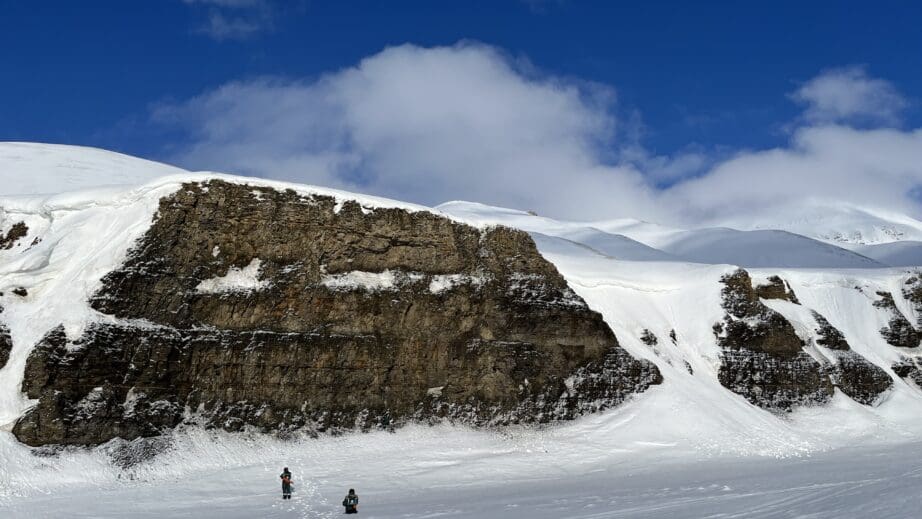AG-222 Integrated Geological Methods: From Outcrop to Geomodel (15 ECTS)
ID:
AG-222
CREDITS:
15 ECTS
APPLICATION DEADLINE:
October 15, 2023
START DATE:
January 08, 2024
END DATE:
May 24, 2024
COURSE PERIOD:
Spring semester (Block 1-3: Week 2-21)

Students conducting independent fieldwork in Hanaskogdalen, April 2023. Photo: Marjolaine Verret/UNIS
| Grade: | Letter grade (A through F) |
| Course Cost: | Fieldwork, max NOK 600 (max 3 days x NOK 200 per overnight stay) |
| Course Capacity Min/Max: | 10/20 students |
| Language of instruction: | English |
| Examination support material: | Bilingual dictionary between English and mother tongue |
Course requirements
60 ECTS within general natural sciences, of which 30 ECTS within the field of geology. The applicant must be enrolled in a programme at Bachelor level, or document that the course is approved into the applicant’s current study programme.
The course should be combined with AG-209 The tectonic and sedimentary history of Svalbard (15 ECTS), and the two courses are designed to complement each other.
Academic content
The geological history of the Svalbard archipelago is a story of how tectonic and climatic processes have affected sedimentation since the Caledonian orogeny. The sparsely vegetated, well exposed and in places well-studied outcrops provide a unique opportunity for entry-level geologists to get an understanding of how geological field data are collected in the field and analysed in the office. This course introduces basic skills in digital geology and gives the opportunity for students to conduct independent fieldwork in the Arctic. Students are faced with practical problems to solve, requiring a comprehensive understanding of Svalbard geological history.
Learning outcomes
Upon completing the course, the students will be able to conduct focused geological field data collection in small groups, be familiar and use a broad range of geological field and digital methods, and actively use these data to produce realistic geological models to answer geological research questions.
Upon completing the course, the students will:
Knowledge
- describe methods and tools used in field and digital geology, including sedimentology, stratigraphy, structural geology, and geological mapping.
- be introduced to emerging technologies relevant for geological fieldwork, including digital outcrop models, virtual reality and integration of various data in the context of Svalbard geological history.
Skills
- perform sedimentological logging, description, and analysis of relevant formations both in the field and in cores.
- develop a basic understanding of geological field mapping techniques.
- actively use digital tools (e.g., photogrammetry) to construct digital models of outcrops and samples, and virtual reality.
- carry out small independent research projects on the geology of Svalbard.
General competences
- work in a group and be able to communicate research to peers and the wider public.
- conduct independent fieldwork under Arctic conditions, and combine diverse data acquisition methods.
- write a simple research grant proposal and a field report.
- read and analyse scientific literature and identify a knowledge gap.
Learning activities
The course extends over a full semester. Initially, students attend one week of compulsory Arctic survival and safety training AS-101 Arctic Survival and safety.
The course will be very practical, with a relatively small number of introduction and overview lectures complemented by practical exercises carried out by the students both individually and in small, assigned groups. These exercises will focus on sedimentology and structural analysis (of cores and near-town outcrops), geomodelling and data integration.
Students will participate in independent fieldwork in Svalbard where each group will be presenting selected geological field sites to their peers.
Summary
- Total lecture hours: 16 hours.
- Total practical exercises/PC lab work: 60 hours.
- Fieldwork/excursions: app. 4 days with overnight stay (in conjunction with AG-209 The tectonic and sedimentary history of Svalbard (15 ECTS), up to 3 day-excursions.
Compulsory learning activities
All compulsory learning activities must be approved in order to be registered for the final assessments.
- Excursions
- Group field work
Assessment
All assessments must be passed in order to pass the course.
| Method | Percentage of final grade |
| Arctic field grant proposal and scientific report from fieldwork (group – 50%), presentation of virtual field trip (group – 20%) and presentation of scientific poster (individual – 30%). | 100 % |
